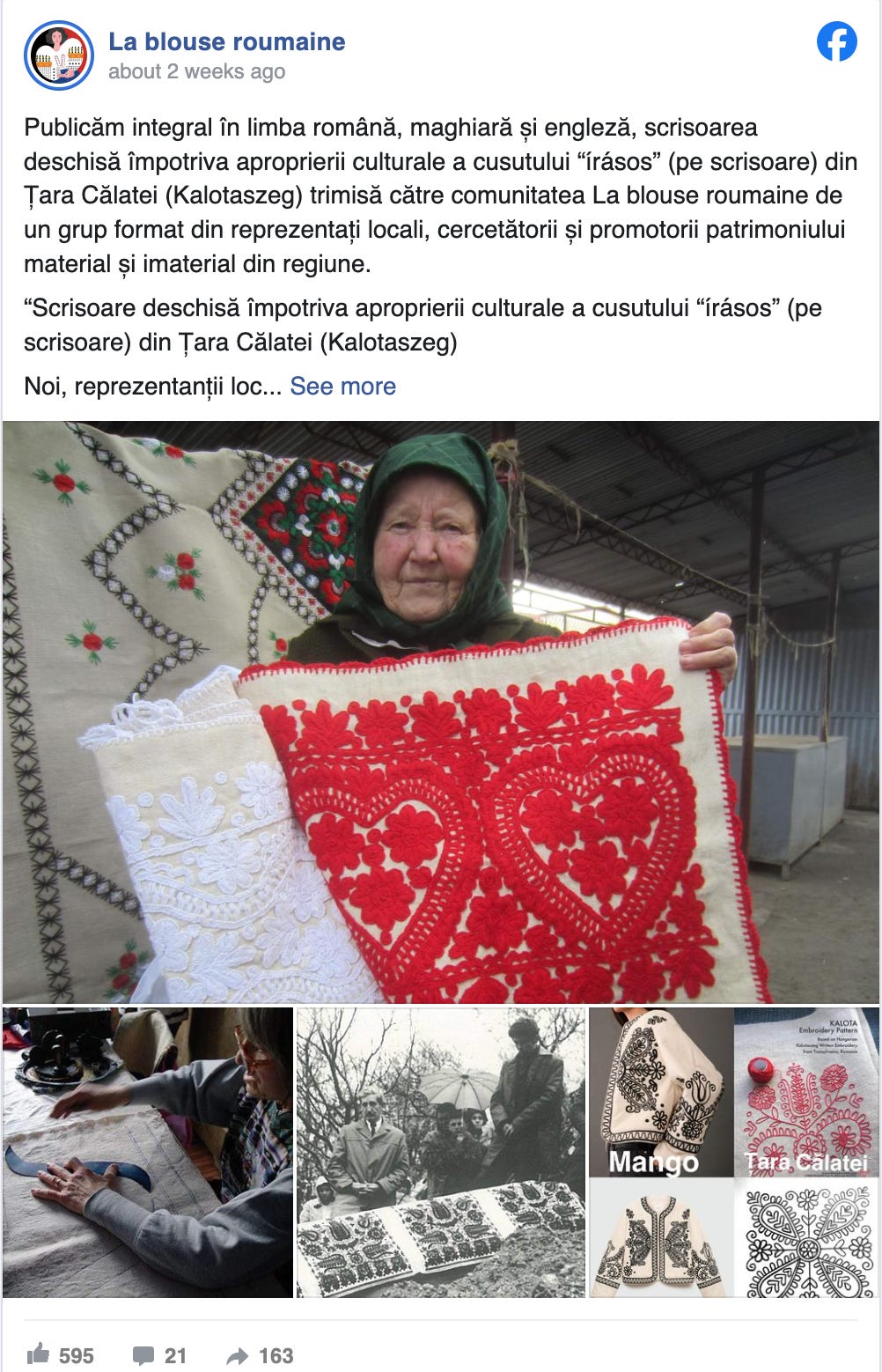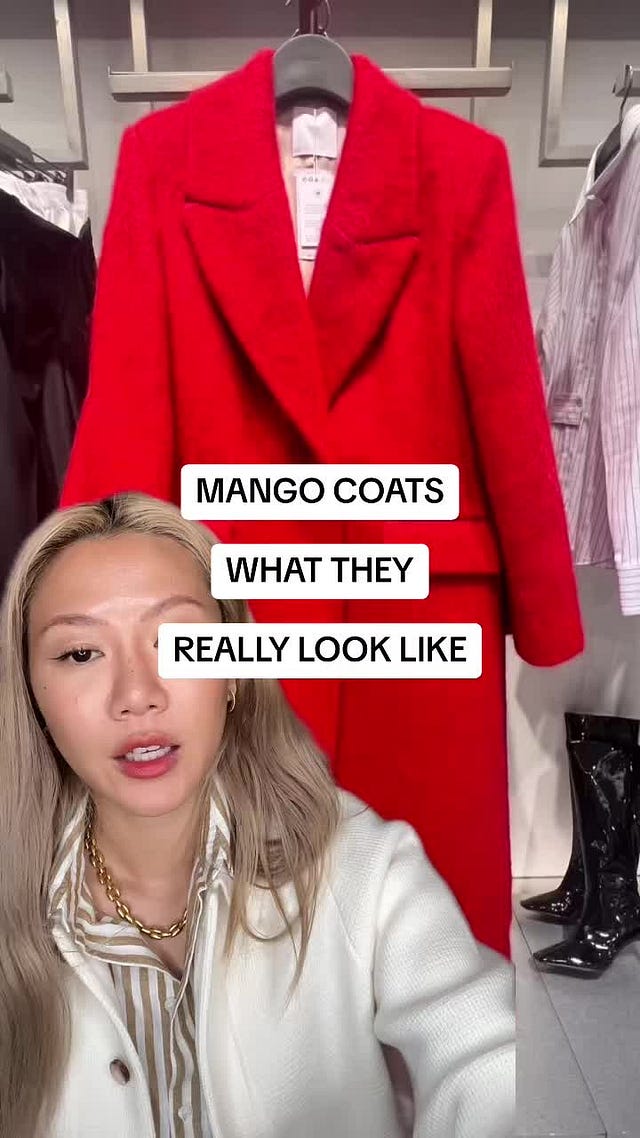One Small Step for Mango, Five Steps Back for Humankind: Mango’s Digital Expansion and the Ethics of Fast Fashion
Mango is just one of the many brands embracing AI like their life depends on it - but when you put it in the big picture, the future of fashion might look very much like the present - except worse.
Spanish fast fashion brand Mango launched a campaign a few months ago using images generated with AI which isn't surprising. At this point, probably predictable. And in the grand scheme of the world, old news now.
But the campaign itself isn't what I keep thinking about. It's completely uninspiring, and unimaginative and upholds most beauty standards.
What I keep thinking about how AI is being used in conjunction with everything else that is happening in the world - because nothing happens in a vacuum.
Mango in many ways is the perfect case study: it massively embraces AI, yet is a fast fashion brand, therefore perfectly showcasing us the a glimpse of the future.
Mango is going hard with AI and digital spaces.
Since 2018 Mango has developed over fifteen platforms that use and apply AI in different areas (eg pricing, personalisation etc). In Jan of this year, Mango joined Robolx and has a virtual Outfit Shopping Mall where users can buy digital clothing and products for their avatars.
Their AI campaign, the Sunset Dream collection, was retouched, edited and mastered by their art team. Mango explained that photos were taken of the clothes, and then "the generative AI model was trained to learn how to generate images by positioning the real garments on a model" - no mention if the model was real, based on a real person or entirely AI.
(It's worth noting that their recent AI campaign was for their teen collection, and their Roblox digital products are also from their teen collection. They're clearly brainwashing prepping the younger generation in the ways of virtual and digital consumerism. Not to mention, normalising AI images which opens up a whole other can of worms).
Mango isn't stopping there and has committed to "digital transformation" over the next two years " which aims to create value through technological development, data management and operational excellence." And why would they stop there? This July they announced that it had its highest revenue in its 40-year history (over 1.543 billion euros) despite inflation and the general state of the world.
Climate crimes issues
The fashion industry as a whole is notorious for being big polluters, and slow to change things. Despite the reduction of its carbon footprint in 2022, emissions are set to grow by more than 40% by 2030 according to an analysis by the trade coalition Apparel Impact Institute. Apparently money is the reason for its slowness. It's expected to take USD 1 trillion over the next few decades to decarbonise the industry.
But conflicting interests and structural challenges have kept investment at a trickle. While big brands have made bold commitments to slash their carbon output, the bulk of that pollution takes place in factories the brands don’t actually own.
Meanwhile, most manufacturers aren’t exactly in a position to be making big investments with long payback times, largely because their customers (the brands) have rigged the system so that they can access production as cheaply and flexibly as possible while taking on almost no financial risk themselves.
It’s a model in which brands take most of the profits, while suppliers are subjected to relentless pricing pressure and unpredictable, trend-dependent cash flows that make for crummy credit ratings.
Fragmented supply chains populated by small and medium-sized businesses already struggle with access to affordable capital, let alone the financing for long-term climate projects with dubious payback potential."
Mango is one of those brands which is why, as of this year, it became part of a group of manufacturers (including Gap, and H&M) to help decarbonise projects by providing manufacturers with cheaper loans. Whilst well-intentioned, the plan has significant questions such as how much of a reduced rate brands will actually give, plus the fact that the entire system itself is set up in favour of the big brands.
For the most part, Mango has improved on sustainability issues, specifically traceability and reporting.
That said, if you go into the store the quality of their clothes is very touch and go. Many of their pieces are not built well or built to last, meaning they are most likely going to be thrown away.
Exploitation
Like many fast fashion brands, Mango has been under fire several times for the treatment of its workers.
In 2013 the Rana Plaza factory complex collapsed in Dhaka, Bangladesh.1,138 people died (most young women) and over 2,500 had life-changing industries. Prior to this, workers had complained about unsafe conditions (such as cracks) but managers threatened to dock their wages if they didn't enter. Mango is one of the brands that had their clothes made there.
During Covid-19 workers in factories belonging to Mango (along with Zara and Primark) told of how managers of these factories used Covid-19 as a way to dismiss hundreds of union members in Myanmar.
In late 2022 there were reports of human rights abuses and anti-union action in factories in Bangladesh, Cambodia, India, Sri Lanka and Indonesia. Mango was one of several fast fashion brands to have their clothes made in these factories. Workers faced violence, threats and discrimination - the majority of victims were women.
However, in May 2023 Mango took steps in Pakistan to ensure workers are protected and safe at work.

Stealing and appropriating
Like most big brands, Mango has also been accus ed of copying designs and appropriation. Despite it having lots of money to pay designers to create something new. Or pay the designers they steal from.
Mango used Tuana's photograph without his consent on a t-shirt in 2013. Once confronted, Mango pulled the clothes. But how it got there in the first place, and the complete waste of clothes is another issue,
More recently, in August of this year, Mango was accused of appropriating a traditional Hungarian Folk embroidery pattern.

AI as a tool in our society and economic system
I often think about the Egyptian writer Nawal El Saadawi, and how she said religion isn't inherently oppressive, and that it's men who use it as a tool to oppress women. I'm inclined to think of AI similarly. It's a tool, and like any tool in the wrong hands can be dangerous.
Just as in the Sherluxe AI blunder (despite them standing by it), when companies - particularly fashion companies and lifestyle brands that push fast fashion, use AI, we must look at it in conjunction with everything else.
Mango is making record profits and is expanding in a big way. They are planning to open XYZ stores. Plus they are investing heavily in AI. In theory, they are making progress and aren't all bad (at least like some other fast fashion brands).
It seems Mango are investing in AI so they can create more profit. But with the money that they are spending on AI, they could invest in better quality and more sustainable pieces. They could use the money to create safer and better working conditions for their staff worldwide. And pay them.
Should we celebrate this advance in technology, in AI, if it means our present problems only continue to grow? Should we celebrate AI helping an already exploitative and pollutive company get more money, open more shops, sell more clothes and intensify the cycle?
AI has a lot of potential, however, to ignore the role it plays in this current stage of capitalism, in society, is to be at best naive. Remaining critical, and holding brands accountable is key. Putting AI and technology firmly in the context in which it exists is essential.









Thanks for talking about this, Georgia. It’s a stark reality we’re living in and it’s not going to get much better except if we talk about it and shed light on these fast fashion terrors. We need to talk about it, we need to yell about it because this over-consumption and mindless collecting of stuff is drowning us.
I really agree with the sentiment that AI is a tool. Honestly, the only way forward with these things is regulation and awareness, I’m convinced of it, otherwise it won’t stop. Great post, I wasn’t even aware of Mango’s AI campaign. Very interesting indeed.